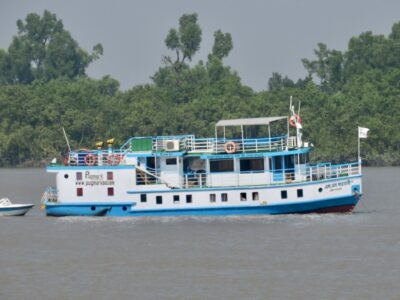
MS in Sustainability Management alumna Monica Munn (’18) has nearly ten years of experience working across the private, nonprofit, and philanthropic sectors to design and execute programs that make cities more sustainable, resilient, and economically inclusive. Today, Monica serves as the director of economic development for the Union Square Partnership, where she leads the organization’s policy, advocacy, and sustainability initiatives. After spending several years considering policy, business, and environmental studies graduate programs, Monica decided upon Columbia’s MS in Sustainability Management program, given its focus on tangible skills that would complement her professional experience and connections to top sustainability practitioners.
What is your current job and what are the responsibilities associated with your position?
As Union Square Partnership’s director of economic development, I lead policy, programming, and partnerships to shape sustainability, waste, transportation and economic development initiatives for the greater Union Square – 14th Street neighborhood in Lower Manhattan. On a given day, I might be meeting with City agencies regarding large infrastructure projects planned for our community, designing pilots to reduce waste in the public spaces the Partnership manages, advising private developers on navigating the city’s land use process, drafting an op-ed calling for improvements to our neighborhood’s transit infrastructure, or presenting programmatic updates at local community board meetings. It’s an incredibly diverse portfolio of work, but I love the opportunity to have my finger on the pulse of all the variables and stakeholders that are required for successful neighborhood development!
Do your current job responsibilities align with the professional goals that you originally had when you began the SUMA program?
When I began the SUMA program, I was working as a program officer at The Rockefeller Foundation, where my portfolio focused both on renewable energy and sustainable food system initiatives. Given my background in urban economic development, I knew I wanted to delve more deeply into solutions to build more sustainable and resilient urban communities and ultimately transition into a role that focused solely on addressing urban sustainability issues. The SUMA program offered numerous opportunities to build the quantitative and qualitative skills (and networks) to assess solutions to reduce cities’ environmental footprint, research various policy and programmatic solutions, and learn about practices from around the globe. In my final semester, I left the foundation for my current role where every day I’m very much putting into practice much of what I studied in the SUMA program.
What inspired you to work in sustainability?
Personally, I’ve always been quite passionate about environmental and wildlife conservation, and an avid outdoors person. (Few things make me happier than scrambling up a mountain.) In my professional life, however, it was when I worked as a consultant at an economic development advisory firm that I became increasingly interested in exploring the intersection of sustainability and urban economic development.
When Superstorm Sandy struck New York City in 2012, many of my small business clients were forced to shutter their operations for weeks, if not longer. Seeing the impact Sandy had on these businesses, their employees, and the wider communities in which they operated underscored for me the importance of building resilience to severe shocks and stresses and the need to mitigate future environmental stresses by advancing sustainable policies, business practices, and infrastructure.
What has been your biggest challenge associated with sustainability in your current position?
As a quasi-government entity that provides public services, implementing many of Union Square Partnership’s programs require input and support from a wide range of government agencies, private businesses, and neighborhood constituents. From a sustainability point of view, this complexity means designing and implementing new sustainability-focused initiatives and requires identifying where existing efforts can be augmented to incorporate sustainability outcomes, gaining buy-in from a myriad of stakeholders with competing priorities, and understanding a wide array of operational implications.
What has been your biggest accomplishment associated with sustainability in your current position?
Right off the bat, I’ve been able to work with our team to begin improving the sustainability of our own operations. For example, we host several large annual events and we’ve taken steps over the last several months to increase procurement of reusable or recyclable materials, cut print production, donate surplus food from catered events, and more. I’m also finalizing several pilot initiatives for later this year that aim to reduce waste generation in the public space, improve diversion of recyclables and organics from landfill in the trash receptacles we manage, and empower our local residents and businesses to make small changes in their daily lives and operations that will improve sustainability throughout our neighborhood. It’s also been exciting to see several of our local businesses start working with great organizations in the food rescue, zero waste, and sustainable food spaces based on connections we made.
What was your favorite class in the SUMA program and why?
Measuring and assessing the environmental impact of organizations, activities, and geographic areas is an essential skill for almost any sustainability practitioner. To get a strong grounding in creating, evaluating, and managing greenhouse gas inventories, I definitely recommend taking Greenhouse Gas Emissions: Measuring and Minimizing the Carbon Footprint (SUMA PS5035). I also particularly enjoyed the Practicum in Innovative Sustainability Leadership (SUMA PS4310) and Environmental Infrastructure for Sustainable Cities (SUMA PS5690). The Practicum exposes you to some of the leading thinkers and doers in the sustainability world, while Environmental Infrastructure is a great deep dive into how to apply a sustainability perspective to transportation, waste, energy, and public realm challenges facing cities.
How do you intend to utilize your degree from the SUMA program in furthering your career?
The knowledge, relationships, and resources I cultivated through SUMA program have already paid dividends in my work at the Union Square Partnership. For example, we are working with a SUMA Integrative Capstone Workshop team currently to identify ways our organization could reduce waste in the public spaces and sidewalks we currently maintain, reducing the environmental footprint of our neighborhood and improving overall quality-of-life. As a lean non-profit, it would have been challenging for us to bring on a traditional consultant to undertake this level of primary research and data collection.
“Working full-time and attending graduate school in the evenings can be challenging,” Monica shared, “but on the flip side, it creates an invaluable opportunity to apply what you’re learning in the classroom on a daily basis, accelerating your expertise and credibility as a sustainability practitioner.”
What tips do you have for your fellow students who are looking for a job in sustainability?
Don’t rule out professional opportunities solely because a job’s title doesn’t include the word “sustainability” or the role isn’t in a “sustainable” sector – e.g., energy efficiency, renewables. There are so many ways you can apply what you’ve learned through the SUMA program and help an organization or field reduce their environmental footprint and establish more sustainable practices.
If you’re an events coordinator, think about how to reduce your waste footprint. Product designers can push for circularity goals in their materials, while property managers can prioritize investments in energy efficient upgrades to their buildings. The sustainability “sector” is constantly growing and changing, which makes it an exciting and flexible area to build your career.
What do you think is the most beneficial aspect of the SUMA program with regard to your career?
I can keep my answer to this question short and sweet: hands down, the network you build with SUMA students and professors.
The M.S. in Sustainability Management, co-sponsored by the Earth Institute and Columbia’s School of Professional Studies, trains students to tackle complex and pressing environmental and managerial challenges. Visit our website to learn more.



